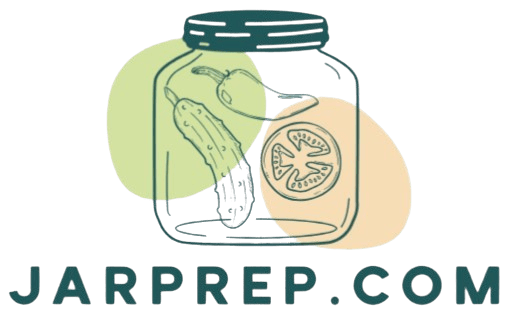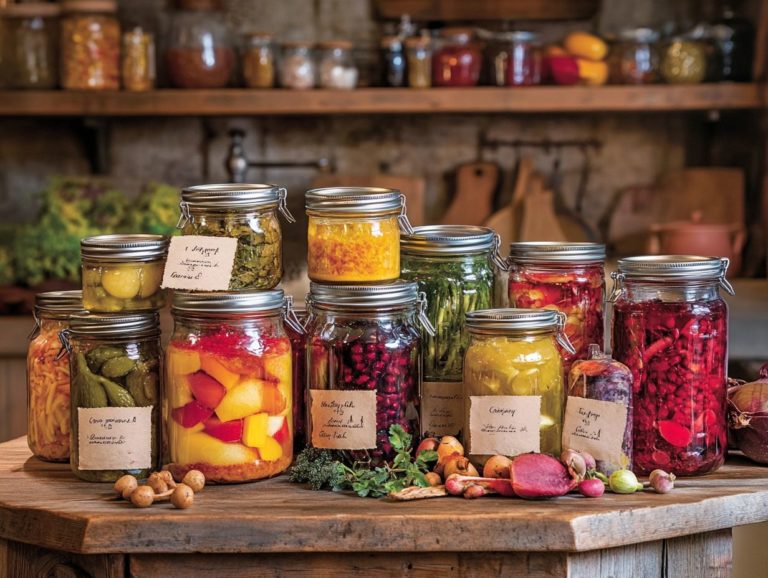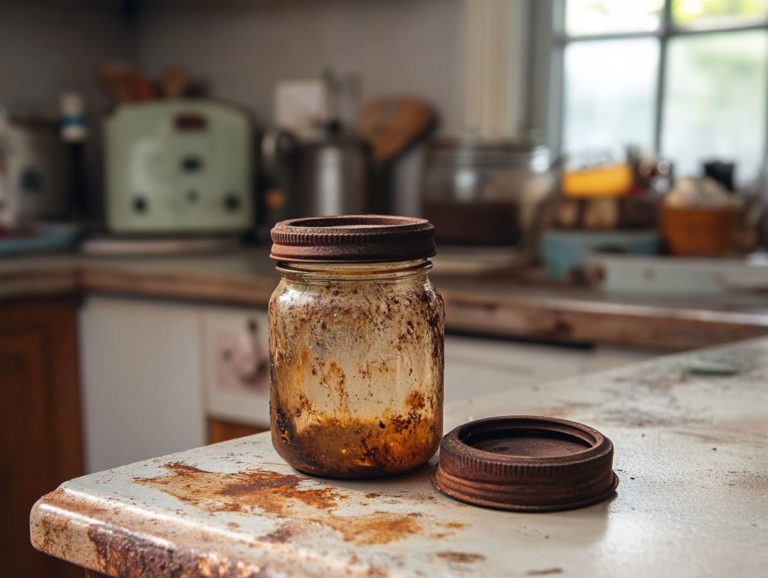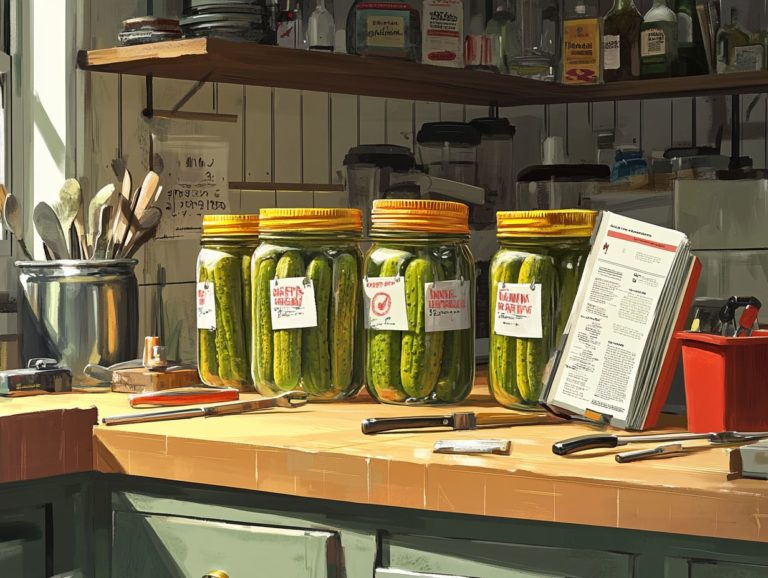How to Identify Spoiled Canned Goods
Expiration dates on canned goods are crucial for your food safety. They help prevent food poisoning from spoiled items.
This article demystifies those dates and provides valuable insights into spotting spoiled canned goods. From visual indicators and off-putting smells to the health risks of consuming expired products, we cover all the essential information you need.
You ll also discover tips for proper storage and safe disposal methods, ensuring your pantry remains both organized and secure.
Jump in and discover how to keep your canned goods fresh and safe!
Contents
- Key Takeaways:
- Understanding Expiration Dates on Canned Goods
- Signs of Spoiled Canned Goods
- Health Risks of Consuming Spoiled Canned Goods
- Proper Storage of Canned Goods
- Disposing of Spoiled Canned Goods
- Frequently Asked Questions
- How can I tell if a canned good is spoiled?
- Can I eat canned goods past their expiration date?
- What should I do if I suspect a canned good is spoiled?
- Are there any visual cues to look for when identifying spoiled canned goods?
- Can I still use canned goods if the can is slightly dented?
- Can canned goods go bad even if the can is not opened?
Key Takeaways:
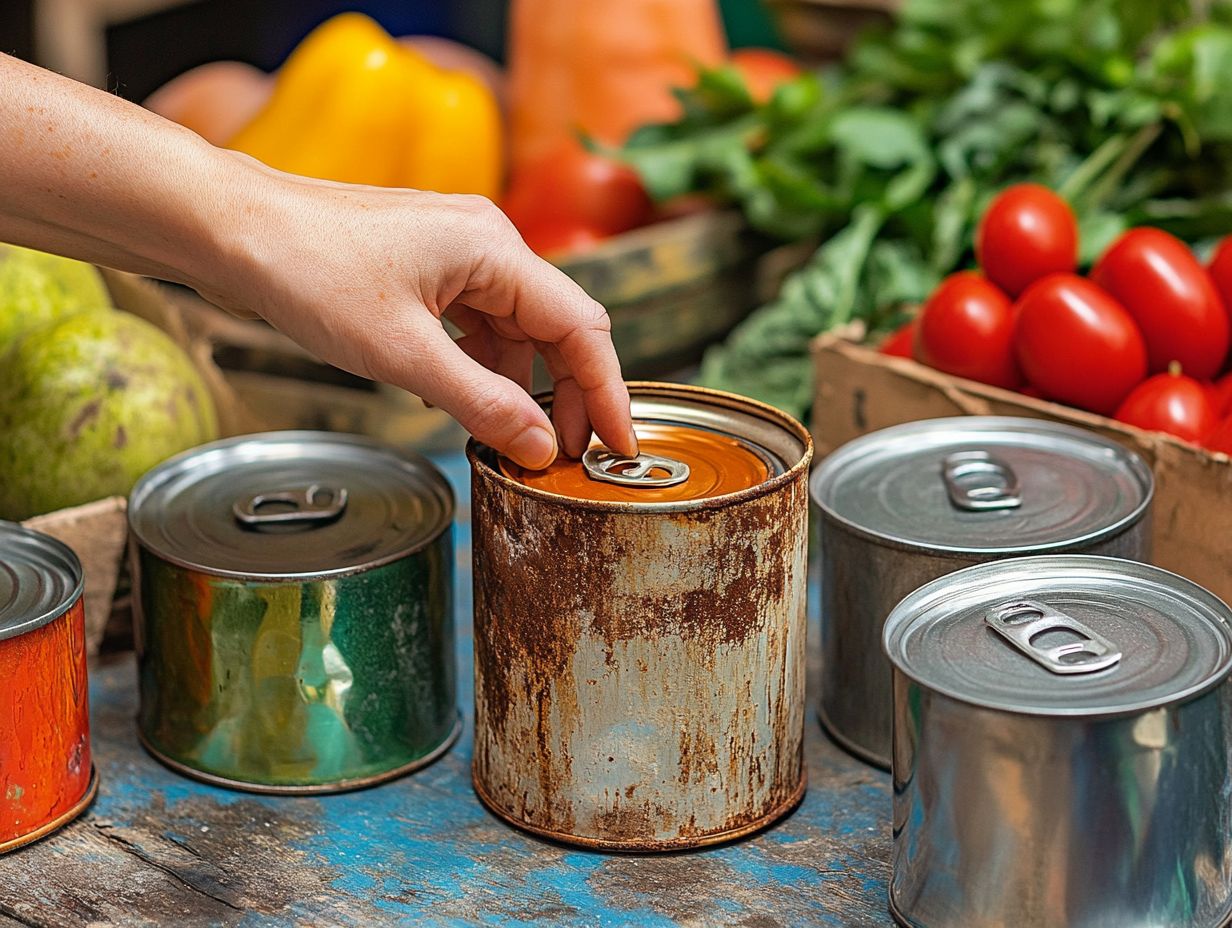
- Always check the expiration date on canned goods and understand what it means. Don’t consume them past the expiration date.
- Look for visual cues such as bulging, rusting, or leaking cans, and unusual smells or tastes in canned goods to identify if they are spoiled.
- Consuming spoiled canned goods can lead to sickness from eating spoiled food, so it’s important to properly store them and dispose of them safely and responsibly.
Understanding Expiration Dates on Canned Goods
These dates offer vital information regarding the quality and safety of canned foods, enabling you to make informed choices about storage and consumption.
Interpreting these dates correctly reduces the risks of food spoilage and contamination. Botulism is one serious foodborne illness to avoid.
It s important to remember that these dates serve as guidelines rather than absolute indicators of food safety.
What Do They Mean?
Expiration dates on canned food act as crucial indicators of both quality and safety, guiding you in determining when your food might not be at its finest.
These dates appear as ‘best by’ and ‘sell by’ labels. The ‘best by’ date serves as a suggestion for when the product is expected to be at its peak freshness and flavor. The ‘sell by’ date helps retailers manage their inventory effectively.
According to the USDA, although these dates signal quality, many foods remain safe to consume even after they ve passed their designated dates, provided they ve been stored properly. It s vital for you to assess factors like appearance, smell, and storage conditions to ensure food safety and minimize waste effectively.
Signs of Spoiled Canned Goods
Recognizing the signs of improperly canned food is essential for your food safety. Consuming improperly canned items can pose serious health risks, including food poisoning.
Look out for signs like a bulging lid, rust, or dents; each of these can jeopardize the integrity of the contents within. Be attentive to any unusual smells or tastes, as a bad odor is often a clear signal that the food is contaminated and should be promptly discarded. To avoid such issues, it’s helpful to know how to prevent mold in canned foods.
Visual Cues
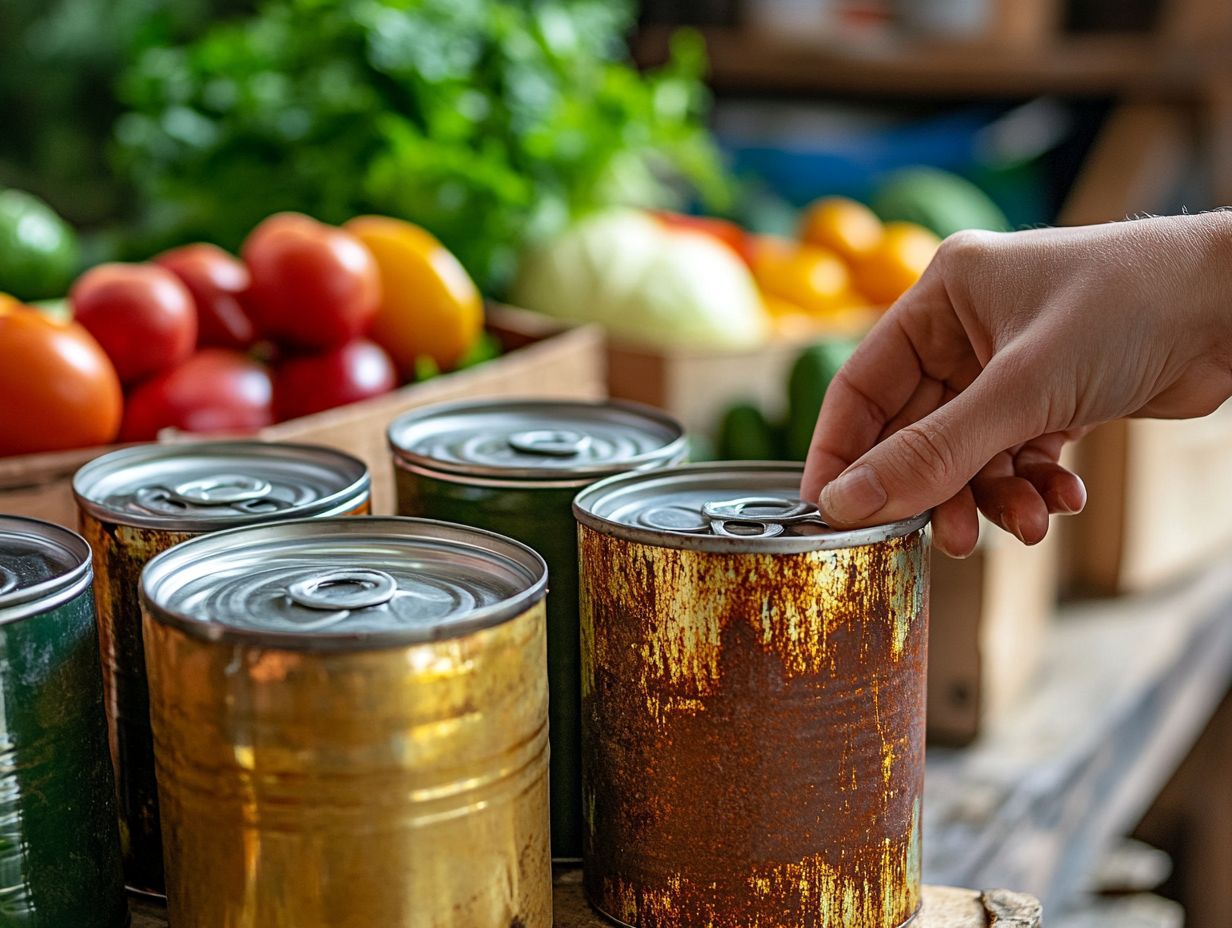
Visual cues play a crucial role in identifying spoiled canned goods and can help in preventing spoilage in your canned goods, ensuring safe food handling practices.
When you assess canned food, it’s essential to closely inspect for signs that could indicate spoilage. For instance, a bulging lid signals gas buildup from bacterial activity, suggesting the contents are unsafe to consume. If you encounter such issues, it’s crucial to know how to safely open faulty canned goods.
Rust corrosion on the can s surface can compromise its integrity, potentially allowing harmful microorganisms to infiltrate. Dented cans, particularly around the seams, should also raise a red flag, as this damage might compromise the seal.
By being vigilant in examining these indicators, you give yourself the power to make informed decisions about food safety and significantly reduce the risk of foodborne illness.
Unusual Smells and Tastes
Unusual smells and tastes in canned goods can be clear indicators of spoilage and potential food contamination. Knowing how to test seals on canned goods can help you identify these sensory signals, which act as your first line of defense, alerting you to possible issues such as improper storage or processing.
When a can emits a sour or off-putting odor, it may suggest harmful bacteria like Clostridium botulinum or Salmonella may be present. Both bacteria thrive in environments with little oxygen. Such pathogens pose serious health risks, including food poisoning. Symptoms can manifest as nausea, vomiting, and abdominal cramps.
Assess your canned goods regularly to ensure safety. Trusting your senses when evaluating food quality is not just prudent it s essential.
Health Risks of Consuming Spoiled Canned Goods
Consuming spoiled canned goods can present serious health risks, primarily due to the potential for food poisoning and exposure to harmful bacteria, including those responsible for botulism. This severe illness may arise from improperly preserved canned foods, where bacteria can thrive and generate toxins.
It s crucial to understand the health risks linked to bacterial growth in canned goods. This knowledge is vital for practicing safe food handling and ensuring your well-being.
Potential Foodborne Illnesses
Consuming spoiled canned goods can expose you to potential foodborne illnesses that range from mild food poisoning to severe and life-threatening conditions like botulism. It’s crucial to know how to make sure canned food is safe before indulging.
These illnesses often stem from improper canning methods that allow harmful bacteria, such as Clostridium botulinum, to thrive. Symptoms can vary greatly, from nausea and vomiting to more alarming reactions like paralysis and respiratory issues in the case of botulism. It s essential to seek medical attention without delay.
Contaminated food acts as a vehicle for these bacteria, underscoring the importance of diligent food safety practices. To safeguard yourself against serious conditions, always inspect canned goods for any signs of bulging or leaking seals, store them in a cool, dry place, and pay attention to expiration dates.
Thoroughly cooking canned foods is another effective way to eliminate potential threats, ensuring that your culinary experience remains safe and enjoyable.
Proper Storage of Canned Goods
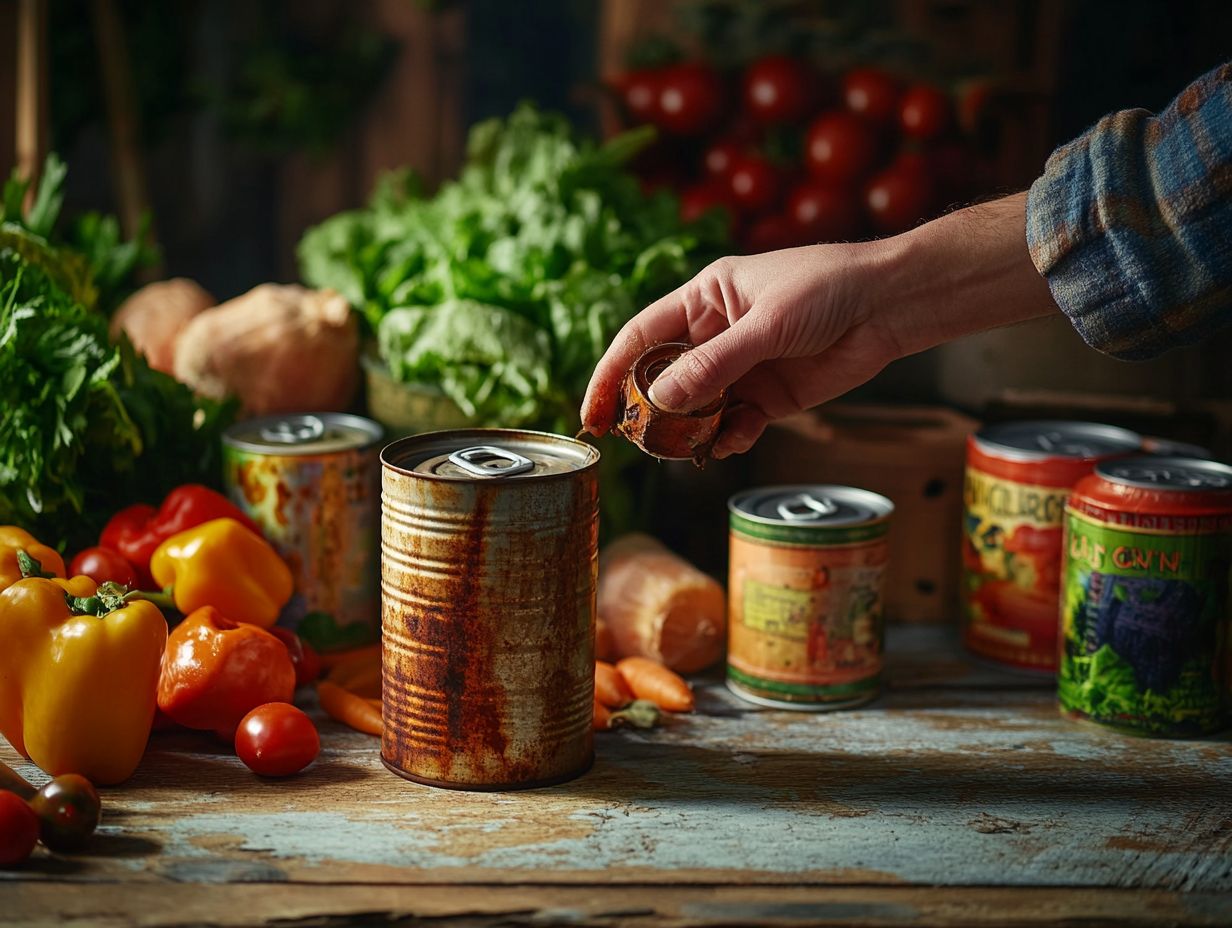
Proper storage of canned goods is essential for maintaining how long food lasts and ensuring optimal food hygiene, effectively preventing spoilage and extending their usability.
By employing techniques like vacuum sealing (removing air from the packaging to keep food fresh), you can significantly enhance the longevity of your canned food, safeguarding it from exposure to air and moisture two factors that can hasten deterioration.
When you grasp the nuances of effective canned goods storage, you elevate your food preservation practices and minimize food waste.
Tips for Extending Shelf Life
- Master proper food storage techniques to keep your canned goods safe and maintain quality.
- Utilize vacuum sealing to reduce exposure to air, effectively stunting the growth of bacteria and mold.
- Store canned goods in a cool, dry place away from direct sunlight to preserve their integrity over time.
- Regularly check your inventory for signs of spoilage or damage.
- Inspect seals and check expiration dates to prevent consuming potentially harmful food.
Follow these tips to keep enjoying your canned goods safely!
Disposing of Spoiled Canned Goods
Properly disposing of spoiled canned goods is essential for upholding food safety and environmental hygiene, as it prevents the spread of harmful bacteria that could contaminate other foods. Use heavy-duty garbage bags for disposal to effectively contain these items and prevent leaks.
Familiarizing yourself with local trash collection guidelines is key to responsible waste management. It’s important to recognize non-recyclable trash when handling spoiled canned food items to safeguard both public health and the environment.
Act responsibly by checking your canned goods regularly and recognizing signs of canning failures, disposing of any spoiled items properly!
Safe and Environmentally-Friendly Methods
Safe and environmentally-friendly methods for disposing of spoiled canned goods involve responsible waste management practices that minimize your environmental impact.
Start by checking if the contents are safe; this allows you to compost any organic material that may be present. By separating food waste from the rest of your trash, you can significantly reduce your contributions to landfills and enrich your soil with nutrient-dense compost.
Adhering to local regulations is crucial. Make sure that dangerous items are disposed of properly to prevent toxins from leaching into the environment.
Recycling metal from empty cans is also an option or follow guidelines for hazardous waste if the contents were potentially dangerous. By engaging in these practices, you not only benefit your immediate surroundings but also contribute to fostering a more sustainable community.
Frequently Asked Questions
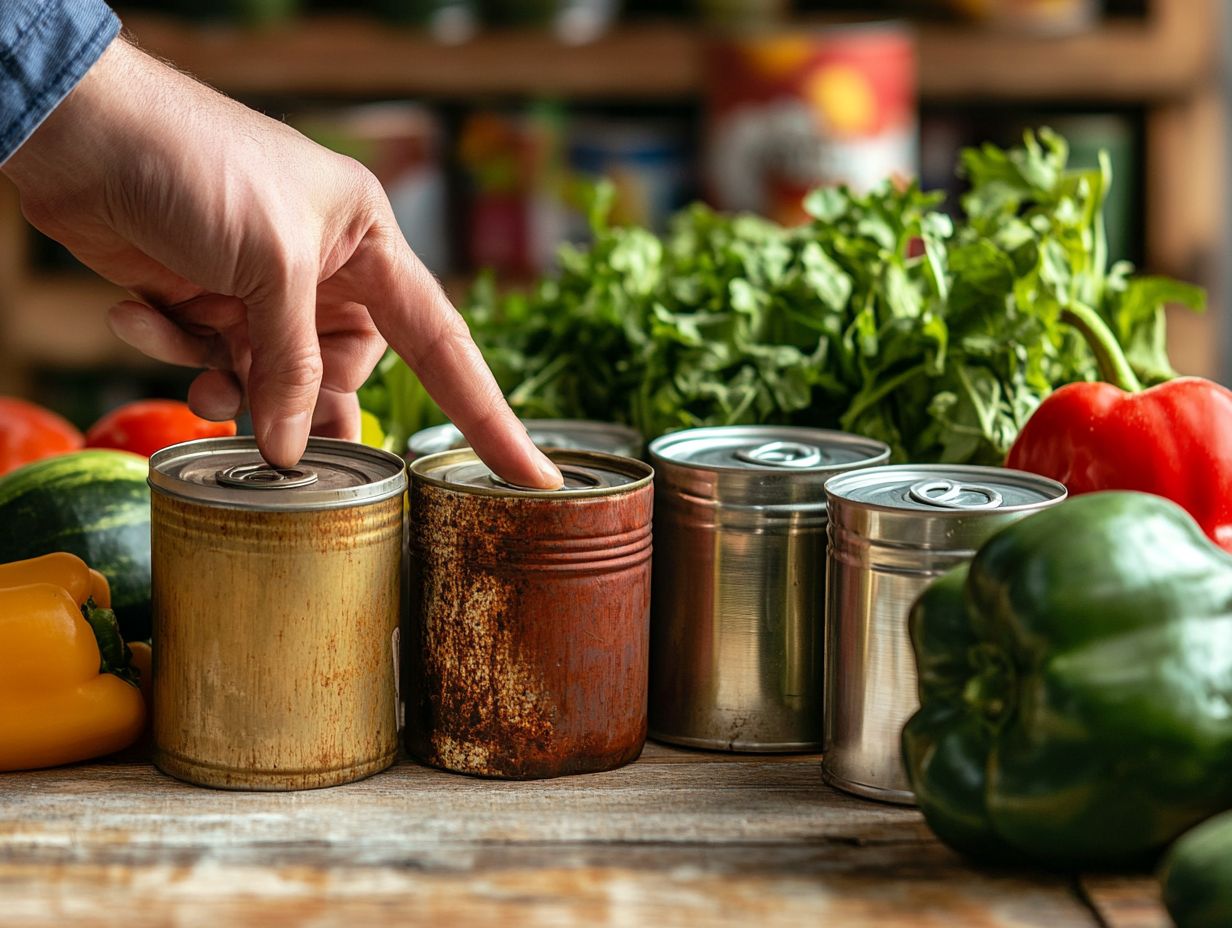
-
How can I tell if a canned good is spoiled?
You can identify spoiled canned goods by looking for signs such as bulging or dented cans, leaking or rusting containers, strange odors, or discoloration of the food inside. For more details, check out this guide on how to tell if canned food is bad.
-
Can I eat canned goods past their expiration date?
It’s best to steer clear of canned goods past their expiration date to keep your meals safe and tasty! Always check for signs of spoilage before consuming.
-
What should I do if I suspect a canned good is spoiled?
If you think a canned good is spoiled, throw it away immediately! Your safety comes first!
-
Are there any visual cues to look for when identifying spoiled canned goods?
Yes, there are several visual cues that can help you identify spoiled canned goods. These include bulging or dented cans, leaking or rusting cans, and unusual odors or discoloration of the food inside. If you suspect spoilage, it’s important to know what to do when your canned food spoils.
-
Can I still use canned goods if the can is slightly dented?
If the dent is minor and the can is still sealed and in good condition, the food inside should be safe to consume. However, if the dent is significant and has caused damage to the can, it’s best to discard the entire can and its contents.
-
Can canned goods go bad even if the can is not opened?
Yes! Canned goods can go bad even if the can is not opened. This can happen due to improper storage, expiration date, or a defect in the canning process. Always check for signs of spoilage before consuming canned goods, even if they have not been opened yet.
Remember, if you’re ever unsure about food safety, don’t hesitate to reach out for help! Your health is important.
